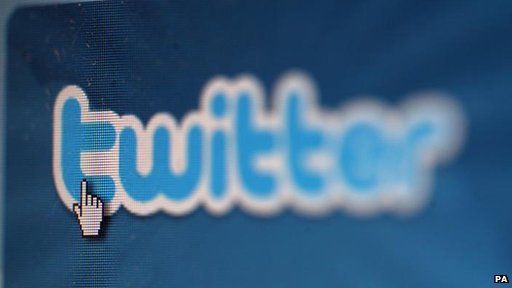Anonymous targets IS sympathisers on Twitter
- Published

Hacktivist group Anonymous is ramping up efforts to tackle sympathisers of the Islamic State group on Twitter.
It has published a list of Twitter accounts it claims are spreading propaganda in support of the group.
Some accounts have been flooded with images of Japanese anime characters to try to influence search engine results for phrases connected to IS.
Many other accounts have been suspended or shut down as a result of the group's actions.
No solution
As well as targeting Twitter accounts, the operation also sought to take down Facebook pages, blogs, websites and web proxies used by supposed IS supporters.
The publication of the list is the latest in a series of "operations" by Anonymous and others hacktivist organisations against the IS group and its online supporters.
The list of more than 750 Twitter accounts that Anonymous has taken action against was published on the Pastebin website. Top of the list were accounts that had more than 10,000 followers, it said, but many others with smaller numbers of readers were also targeted.
Some accounts that Anonymous members won access to had their messages and images changed to show the ISIS-Chan anime character. Groups tackling IS propaganda online are starting to use images of the young girl in connection with the group's name and slogans in an attempt to dilute the results people get when they search for information about the group.
The Anonymous action comes after UK Prime Minister David Cameron unveiled a strategy to help tackle the "poison" of extremism. The package of measures included demands that ISPs and net firms do more to remove extremist material and identify who posted it.
It is not clear how much effect the action by Anonymous and others is having on the work IS does to spread its message online. One study released earlier this year estimated that the group and its sympathisers control more than 90,000 Twitter accounts.
"There is definitely utility in shutting down accounts," said JM Berger, an analyst that did the study of IS' use of social media.
"It's not going to eliminate IS's presence online, but it helps limit their ability to accomplish their goals, particularly with respect to spreading its propaganda outside of its core audience," he said.
"It also wastes their time and requires ISIS supporters to spend a lot of bandwidth rebuilding the network instead of recruiting and promoting their views," he added.
Rashad Ali, a senior fellow at the Institute for Strategic Dialogue which works on ways to counter extremism said the approach did have merit.
"The action is both positive and negative," he said.
"Practically speaking, you are getting rid of a whole host of people from the public domain," he said, adding that such a large takedown can undoubtedly have an impact.
"However," he said, "it's not a solution because what we now need to do is not just take down accounts but actually provide new narratives for people.
"This is where we are failing," he said. "We have not had a strong, thought-out counter-argument to IS's message."
- Published20 July 2015
- Published18 June 2015
- Published9 February 2015
- Published27 May 2014